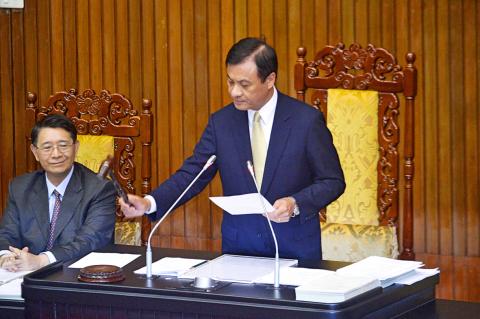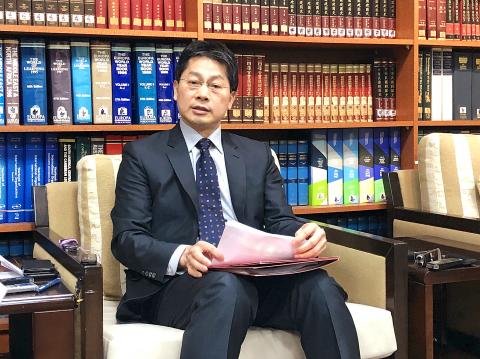Two government measures introduced to attract skilled foreign workers took effect yesterday.
The Ministry of Foreign Affairs began issuing “job-seeker visas” for foreigners as part of an initiative to attract skilled professionals, while the National Immigration Agency rolled out its online platform for foreign professionals applying for employment in Taiwan.
Interested foreigners who meet the government’s qualifications can apply for the job-seeker visa, which is valid for three months and can be extended to six months, Bureau of Consular Affairs Director-General Chen Chun-shen (陳俊賢) said, adding that an annual quota for such visas had been set at 2,000.

Photo: CNA
The legislature in October last year passed the Act for the Recruitment and Employment of Foreign Professionals (外國專業人才延攬及僱用法), a bill drafted by the National Development Council.
The act relaxed immigration regulations for white-collar foreign workers, stipulating more favorable policies regarding visas, residency permits, insurance, taxes and retirement plans.
However, it imposed limits on the number of foreign professionals permitted in the nation to reduce its effect on employment opportunities for Taiwanese.

Photo: Lu Yi-hsuan, Taipei Times
The government is to review the policy’s effects so it can adjust the visa quota in accordance with the nation’s needs.
The foreign ministry and the Ministry of the Interior jointly formulated the provisions, Chen added.
To qualify, applicants must either have work experience and an average income of more than than NT$47,971 per month in the the six months preceding the date of their application or have graduated in the past year from a university on the Ministry of Education’s global top 500 institutions list.
The foreign ministry and other appropriate authorities can also choose to qualify an individual for the visa.
Job-seeker visa holders are allowed re-entry to the nation, the bureau said.
The list of required documents and the application process are available on the bureau’s Web site, it said.
The Foreign Professionals Online Application Platform, designed to streamline work permit, resident visa, alien resident certificate and re-entry permit applications into a four-in-one “jobs gold pass” is a milestone in Taiwan’s efforts to recruit skilled workers, the agency said.
The platform will simplify the application process, increase government efficiency and facilitate cooperation with the labor and foreign ministries, it said.
The system forwards an applicant’s documents to the appropriate authorities and allows them to pay a handling fee online, it said.
After an application is granted, the work certificate could be issued in the nation’s overseas representative offices or the agency’s local office in the country, depending on where the application was originally filed, it said.
Approved applicants can download their work certificate receipt to enter the nation, then obtain the actual certificate at their immigration agency office of choice, it said.
Holders of the jobs gold pass are not required to stay with a specific employer and are to receive other benefits, including income tax deductions, up to one year of stay for first-degree relatives and spouses, resident status for spouses and non-adult offspring and access to the National Health Insurance program in less than six months of residency, the agency said.
Qualified foreign nationals, as well as residents of Hong Kong and Macau, are welcome to apply via the platform, it said.

Rainfall is expected to become more widespread and persistent across central and southern Taiwan over the next few days, with the effects of the weather patterns becoming most prominent between last night and tomorrow, the Central Weather Administration (CWA) said yesterday. Independent meteorologist Daniel Wu (吳德榮) said that based on the latest forecast models of the combination of a low-pressure system and southwesterly winds, rainfall and flooding are expected to continue in central and southern Taiwan from today to Sunday. The CWA also warned of flash floods, thunder and lightning, and strong gusts in these areas, as well as landslides and fallen

WAITING GAME: The US has so far only offered a ‘best rate tariff,’ which officials assume is about 15 percent, the same as Japan, a person familiar with the matter said Taiwan and the US have completed “technical consultations” regarding tariffs and a finalized rate is expected to be released soon, Executive Yuan spokeswoman Michelle Lee (李慧芝) told a news conference yesterday, as a 90-day pause on US President Donald Trump’s “reciprocal” tariffs is set to expire today. The two countries have reached a “certain degree of consensus” on issues such as tariffs, nontariff trade barriers, trade facilitation, supply chain resilience and economic security, Lee said. They also discussed opportunities for cooperation, investment and procurement, she said. A joint statement is still being negotiated and would be released once the US government has made

SOUTH CHINA SEA? The Philippine president spoke of adding more classrooms and power plants, while skipping tensions with China over disputed areas Philippine President Ferdinand Marcos Jr yesterday blasted “useless and crumbling” flood control projects in a state of the nation address that focused on domestic issues after a months-long feud with his vice president. Addressing a joint session of congress after days of rain that left at least 31 dead, Marcos repeated his recent warning that the nation faced a climate change-driven “new normal,” while pledging to investigate publicly funded projects that had failed. “Let’s not pretend, the people know that these projects can breed corruption. Kickbacks ... for the boys,” he said, citing houses that were “swept away” by the floods. “Someone has

‘CRUDE’: The potential countermeasure is in response to South Africa renaming Taiwan’s representative offices and the insistence that it move out of Pretoria Taiwan is considering banning exports of semiconductors to South Africa after the latter unilaterally downgraded and changed the names of Taiwan’s two representative offices, the Ministry of Foreign Affairs (MOFA) said yesterday. On Monday last week, the South African Department of International Relations and Cooperation unilaterally released a statement saying that, as of April 1, the Taipei Liaison Offices in Pretoria and Cape Town had been renamed the “Taipei Commercial Office in Johannesburg” and the “Taipei Commercial Office in Cape Town.” Citing UN General Assembly Resolution 2758, it said that South Africa “recognizes the People’s Republic of China (PRC) as the sole